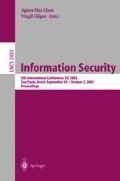Abstract
The paper presents a new protocol for counting 1-bit secrets without revealing if the bit is 1 or 0 in publicly verifiable way. Other than the conventional multi-party protocols that involve enormous number of rounds and huge bandwidth consumption, the proposed protocol, based on the Mix and Match approach [2] in which computations are dealt with ciphertexts, requires a non-interactive constant number of round and simple but verifiable computation for both of sender and counter. The expected application of proposed protocol is an (one-bit) secret voting in which voters cast a ballot encrypted by a public key and an oblivious party (counter) makes a tally of how many votes are polled. The final tally is represented as a k-digit binary register consisting of k ciphertexts that only collaboration of distributed authorities can decrypt. Opening only the MSB of ciphtertexts allows us to see if more than half voters cast “Yes” or not without revealing the details of total number. The cost for opening is O(log n), where n is a number of voters. With the proof of knowledge, voters can prove that the vote is either 1 or 0 without revealing their privacy. The proposed protocol is universally verifiable because any third party can verify that voters, a counter and administrators do not violate the protocol. The protocol is robust against up to a constant number of malicious administrators using standard threshold scheme.
Access this chapter
Tax calculation will be finalised at checkout
Purchases are for personal use only
Preview
Unable to display preview. Download preview PDF.
References
M. Abe, “Universally Verifiable Mix-Net with Verification Work Independent of the Number of Mix-Servers,” IEICE Trans. Fundamentals, Vol. E83-A, No.7, July 2000.
M. Jakobsson and A. Juels, “Mix and Match: Secure Function Evaluation via Ciphertexts,” Proc. of ASIACRYPTO 2000, LNCS 1967, pp. 162–177, 2000.
T. P. Pedersen, “A threshold cryptosystem without a trusted party,” EUROCRYPTO’91, pp. 522–526, 1991.
R. Cramer, I. Damgard, and B. Schoenmakers, “Proofs of partial knowledge and simplified design of witness hiding protocols,” CRYPTO’94, pp. 174–187, 1994.
J. Camenisch and M. Michels, “Proving in Zero-Knowledge that a Number Is the Product of Two Safe Primes,” EUROCRYPT’99, pp. 107–122, 1999.
J. Katz, S. Myers and R. Ostrovsky, “Cryptographic Counters and Applications to Electronic Voting,” EUROCRYPT 2001, 2001.
R. Cramer, R. Gennaro and B. Schoenmakers, “A Secure and Optimally Efficient Multi-Authority Election Scheme,” EUROCRYPT 1997.
S. Goldwasser and S. Micali and A. Wigderson, “How to Play Any Mental Game, or a Completeness Theorem for Protocols with an Honest Majority,” STOCr'87, 1987.
Author information
Authors and Affiliations
Editor information
Editors and Affiliations
Rights and permissions
Copyright information
© 2002 Springer-Verlag Berlin Heidelberg
About this paper
Cite this paper
Kikuchi, H. (2002). Oblivious Counter and Majority Protocol. In: Chan, A.H., Gligor, V. (eds) Information Security. ISC 2002. Lecture Notes in Computer Science, vol 2433. Springer, Berlin, Heidelberg. https://doi.org/10.1007/3-540-45811-5_34
Download citation
DOI: https://doi.org/10.1007/3-540-45811-5_34
Published:
Publisher Name: Springer, Berlin, Heidelberg
Print ISBN: 978-3-540-44270-7
Online ISBN: 978-3-540-45811-1
eBook Packages: Springer Book Archive

